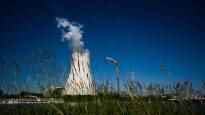Europe’s leading economy is drifting into a crisis due to the price of energy. Its recession would be reflected in unemployment in Finland as well.
Germany is regulating its gas consumption and drawing up emergency plans to keep homes warm and avoid a bad energy crisis next winter.
Germany is in dire straits as gas and oil prices rise. Even the government admits that the country has relied too much on gas for energy, and especially on Russian gas, in the past years.
When Germany has also reduced its nuclear power, it will have to increase the use of coal again. Coal is clearly cheaper than gas, but produces twice as many emissions.
Chancellor from the beginning of the week Olaf Scholz convened a crisis meeting in which various social interest groups, from trade unions to employers, were represented. The purpose is to get a broad consensus on the necessary actions.
– We have to be prepared for the fact that the situation will not change in the near future. In other words, we are facing a historic challenge, Scholz said after the meeting.
In May, Germany’s trade balance fell below freezing for the first time in more than thirty years.
For a couple of decades now, Germany has managed to register an average foreign trade surplus of more than ten billion euros per month. Even during the corona pandemic, the current account did not slip into the red.
Now the dive is due, for example, to the fact that the price of energy imported from Russia to Germany has risen at the same time that exports to Russia have stopped. Germany is now threatened with recession.
European Minister Titti Tuppurainen estimated in an interview with on Friday that the gas availability problems in Germany could at worst cause a chain reaction. Germany is Finland’s most important trading partner.
To prevent a chain reaction, joint actions may still be needed at the EU level as well.
What is Germany’s problem?
The cause of the historically difficult situation is the energy crisis and the resulting accelerating inflation, i.e. the rise in consumer prices.
Russia has significantly reduced its gas supplies to Germany since mid-June. Germany’s largest gas company, Uniper, owned by the Finnish state company Fortum, has received just under half of the agreed gas deliveries from Gazprom.
As a result of the gas crisis, the German government stated at Midsummer that there is officially a gas shortage in the country. At the same time, the gas import contingency plan moved to the second level on a three-step contingency scale.
President of the EU Commission Even Ursula von der Leyen warned this week that Europe must prepare for the end of all Russian gas supply in the near future. It will hit Germany the hardest.
“The problem is not only Germany”
The head of trade policy of the Confederation of Finnish Business Timo Vuoren in my opinion, there is reason to worry in Finland too if the German economy and exports are doing badly.
– We suffer from the same problems in Finland and Germany. In other words, we are pretty quickly in the same problems as Germany in Finland as well, says Vuori.
Finland mainly exports intermediate products and production factors to Germany, from which Germany processes export products.
the Bank of Finland’s monetary policy expert Lauri Vilmin think that economic risks have increased everywhere in the euro area and not only in Germany.
– One can be worried about Germany’s dependence on gas. In general, the energy market and the availability of gas are currently the biggest economic risk in the euro area, Vilmi estimates.
Unemployment may start to rise in Finland in the fall.
– Or the decline in unemployment, which has continued, can stop, he formulates.
During the fall, you can see negative growth figures, i.e. a slowdown in the economy.
– The economic outlook has clearly weakened, and in that sense it is necessary to prepare for a weaker future, says Vilmi.
EK’s Timo Vuori does not believe in a direct recession, in which the economy shrinks strongly for a long time.
– Times are not easy, but I’m not going to paint a picture of a recession just yet. From the point of view of trade and export, you just have to be able to try to get new markets, and on the other hand, hold onto the old markets as well, and not worry about whether there will be a recession or not, Vuori says.
Finns have a double risk in Germany
Finland’s economy is linked to Germany through exports, but taxpayers also have a direct interest in Uniper, a subsidiary of the state-owned company Fortum. Uniper has become a crisis company in the Russian war of aggression.
Even before the war in Ukraine, Uniper built its production largely on fossil energy, which Europe is now getting rid of due to climate change.
If and when more deliveries of Russian gas are interrupted in the future, the entire future of Uniper is threatened. Fortum’s position has been that a national solution to the situation is needed in Germany. It would ensure the functioning of the energy market.
Just on Friday, Fortum proposed to Germany that in order to save Uniper, the state would take over essential parts of the company for its energy system.
You can discuss the topic until Sunday evening at 11 p.m.
